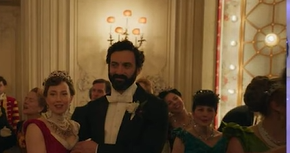Greg’s Family Tensions Unveiled: The Costly Wedding, Joan’s Frustration, and a Mother’s Protective Instincts
In the latest whirlwind of 90 Day Fiancé, a seemingly mundane discussion about socks reveals a far more complex web of family tension, financial struggles, and cultural clashes that threaten to overshadow the plotlines of love and marriage. At the heart of it all is Greg, a seemingly laid-back 35-year-old man whose life appears to revolve around living at his mother Lucille’s house, avoiding stable employment, and navigating the frustrations of a bride-to-be, Joan, who’s eager to start a new chapter. But beneath the surface, subtle yet significant conflicts threaten to derail their plans, exposing simmering resentment, financial dependence, and conflicting cultural expectations that could forever change the family dynamic.
The episode opens with tension rapidly escalating over Greg’s living arrangements and the question of independence. Joan, who has recently moved to the U.S. from Uganda on a K-1 visa, is already feeling the weight of her circumstances—living in a house where her fiancé’s mother pays all the bills, they don’t pay rent, and her privacy is limited. When she subtly hints that Greg should spend more time outside the house, Lucille, Greg’s protective mother, perceives it as an insult. Her immediate response—asking Joan for a mere thousand dollars to help cover wedding expenses—underscores her generous, if somewhat overbearing, nature. But Joan, who’s been clear about her desire to be independent and to move out, isn’t thrilled. She views Lucille’s offer to pay for the wedding as yet another example of her being bailed out, feeling that Greg and his family are hindering her chances to stand on her own two feet.
The tension continues to simmer as Joan’s frankness comes off as rudeness to Lucille, who perceives her daughter-in-law’s comments about spending too much time at home as disrespectful. The situation reveals a cultural and generational divide: Lucille has nurtured and cared for Greg his entire life, almost to the point of overprotection. She’s proud of her role in her son’s well-being and is reluctant to let go, especially as she views Joan’s desire for independence as a slight. Joan’s directness, although honest, seems to challenge Lucille’s maternal instincts, creating an awkward scene that leaves viewers questioning whether these conflicts are real or exaggerated for drama. As they continue folding socks—an activity that symbolizes the mundane yet tense atmosphere—the undercurrents of resentment and unspoken frustrations bubble beneath the surface. 
Amidst the family fallout, a significant topic revolves around the wedding plans. Joan’s desire for a modest, meaningful ceremony clashes with Lucille’s preferences—a venue, a budget, and cultural expectations that seem worlds apart. Lucille, despite her initial reluctance, reveals her willingness to pay for the wedding, offering to cover most of the expenses if Joan and Greg contribute only a small portion. It underscores Lucille’s desire to provide for her son’s happiness but also highlights her over-involvement in preparations—an act that Joan perceives as smothering. Joan, who clearly craves independence, resents being financially dependent on her mother-in-law, viewing it as an obstacle on her journey toward a new life. Meanwhile, Greg seems content to bask in the support, his demeanor carefree as he lights up upon hearing Lucille’s generous offer. To him, it’s merely a financial transaction; to Joan, it’s another reminder of her lack of agency.
The episode takes a deeper turn as Greg’s mother reveals her perspective on her son’s lifestyle. She admits she has always been overly protective and perhaps allowed Greg to stay in his comfort zone for too long. Her concern that Greg’s failure to find a stable job and her constant financial support hinder his growth and her own peace of mind. She openly questions if Joan is genuinely interested in her son or simply taking advantage of her kindness. Her worries are understandable—after all, she’s been the primary provider, and she fears losing her “baby boy” to a woman who may not be aligned with her values. Still, her protective instincts are intertwined with maternal guilt—she loves her son dearly but struggles to accept that he may never fully step into adulthood. Her honesty, while perhaps blunt, exposes a core family conflict: the battle over financial independence, cultural expectations, and the desire to be truly loved and respected.
As tensions reach their peak, the episode hints at deeper issues—whether it’s Greg’s reluctance to step up, Joan’s frustration at her dependence, or Lucille’s desire to maintain control. These family dynamics threaten the wedding plans, with Lucille raising concerns about her capacity to host such a large event at her house, citing the extra work and her own exhaustion. Despite her worries, she’s willing to contribute financially, revealing a complex mix





